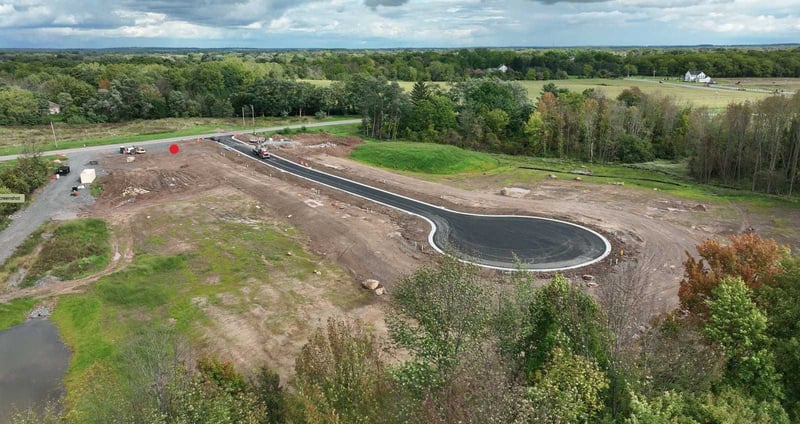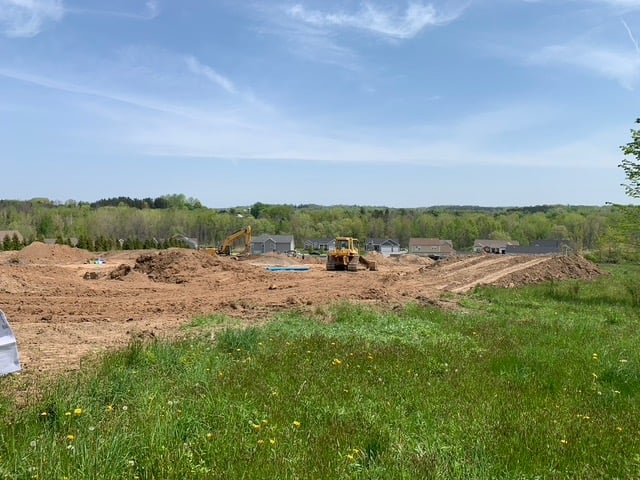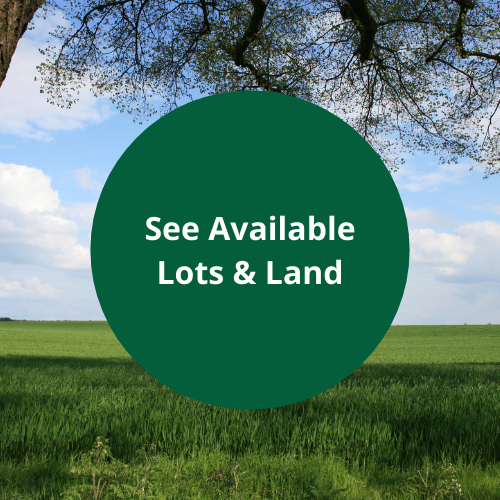
The availability of prime building spots is one of the many advantages of living in the Greater Rochester/Finger Lakes Area. Whether you want a smaller suburban plot close to stores and highways or a sprawling, multi-acre spread deep in the woods, you’re bound to find the perfect lot. Buying undeveloped land is a little more complicated than purchasing an existing home or a house in a new home community and involves a few extra steps, Gerber's extensive experience in partnering with homeowners for site selection services equips us to walk you through the details of evaluating raw land for development.
 Looking Into Zoning
Looking Into Zoning
Zoning regulations are a critical aspect to consider when buying land, especially if you have specific plans for your property. These rules dictate what activities can and cannot be carried out on a piece of land, influencing everything from the type of structures you can build to the activities you can undertake.
-
Understanding Zoning Laws: Start by researching the local zoning laws in the area where you're considering buying land. Zoning laws are established to control land use, ensure public safety, and maintain the character of a community. They can vary significantly from one area to another, so it's essential to understand the specific regulations applicable to the parcel you're interested in.
-
Types of Zoning: Common zoning categories include residential, commercial, industrial, and agricultural. Each category comes with its own set of rules regarding building sizes, heights, lot coverage, and the distance buildings must be set back from the property lines. For instance, if you're looking to buy land to build a house, you'll need to ensure it's zoned for residential use.
-
Special Use Permits and Variances: In some cases, your plans for the land might not align with the current zoning laws. However, you might still be able to proceed by applying for a special use permit or a variance. These are exceptions that can be granted under certain conditions, allowing for uses not typically permitted under the current zoning classification.
-
Contacting Local Authorities: Reach out to the local zoning and planning department to get detailed information about the zoning regulations for the land you're considering. They can provide insights into what's permissible and the process to apply for any necessary permits or variances.
-
Long-Term Considerations: When buying land, it's also important to consider any potential changes in zoning laws. Future developments or changes in land use policies can affect your property and its value. Stay informed about any proposed changes in the local area's development plans.
-
Professional Advice: Given the complexity of zoning laws, consulting with a land use attorney or a professional land planner can be beneficial. They can offer expert guidance, help navigate the application process for permits or variances, and provide valuable advice on land development.
Boundaries and More: Land Surveys
When venturing into the purchase of land, whether it's for building a custom home or for development, having accurate information about the property is paramount. Unfortunately, sellers may not always have the most precise data regarding land size and boundaries, which is where the importance of a land survey comes into play.
-
Accuracy in Property Details: A land survey is a detailed examination of a property's boundaries and dimensions. It provides an exact depiction of the property, delineating its size, shape, and any physical features or improvements on the site. This information is critical, especially when dealing with raw land development, as it forms the basis for planning and development.
-
Legal Implications: Surveys are vital in legal matters concerning the land. They can help in resolving disputes over property lines and ensure compliance with local zoning laws and regulations. This is crucial in avoiding potential legal conflicts in the future.
-
Facilitating Land Use Planning: For those involved in the process of buying land and building a house, a land survey provides essential data for site planning. It helps in understanding the land's topography, identifying suitable building sites, and planning for infrastructure like driveways, utilities, and septic systems.
-
Identifying Potential Issues: A thorough survey can reveal issues such as encroachments (where a neighboring property oversteps into the parcel), easements (rights that others may have on the property), or environmental concerns that could affect the land's usability.
-
Guiding Construction: For those taking steps to build a house on raw land, a survey aids in the preparation of a detailed home site plan and is crucial in the process of preparing the ground for the foundation. It ensures that construction is carried out within the property boundaries and in line with local building codes.
 Checking Out the Basics
Checking Out the Basics
1. Utilities: Can you tie into water or sewer lines, or will you need to install a well and septic system on the property? What about electricity and cable? Costs to extend water, sewer, and utility lines vary depending on the distance but can add thousands to the cost of building a home on raw land.
2: Test the Soil: Soil tests will help you determine if it’s even possible to build on the land. If the soil contains a lot of clay or silt, it may not be able to support buildings adequately. Boulders, swamps, old wells, and other obstacles may force you to reconsider where you’ll place the house on the property. You’ll also need to locate water sources on the property if you’ll be relying on well or spring water.
3: Perc Test: A percolation (perc) test will be needed to determine the best place to put a septic system. After waste enters the septic system, liquids are funneled into a leach field. If the soil is too hard or soft, the leach field won’t be able to absorb the liquids. Before you buy land, you’ll want to be sure it can pass the perc test.
4. Consider Access: What about accessibility? How easy will it be to get to work during a winter snowstorm? Is there a school bus stop nearby, or will you have to drive the kids to school? How far will you have to travel to buy a loaf of bread or fill up your tank?
 Preparing the Site
Preparing the Site
When it comes to transforming a piece of undeveloped land into the site of your future custom home, understanding and executing the necessary preparation steps is crucial. This preparation process is often more involved than it initially appears, especially when aiming to build a house on raw land. Here’s a detailed look at what this entails:

Initial Land Assessment
-
Site Evaluation: Before any physical preparation begins, a comprehensive site evaluation is essential. This includes assessing the topography, understanding the soil composition, and identifying any potential challenges. As we've discussed, soil tests are crucial to determine if the land is suitable for building, especially when it comes to supporting foundations.
-
Environmental Considerations: Evaluating the environmental impact of developing the land is also vital. This may include understanding the local ecosystem and ensuring that your building plans are environmentally responsible.
Land Clearing and Grading
-
Removal of Obstructions: Clearing the land often involves removing rocks, trees, and other natural obstructions. The extent of this clearing can significantly impact your budget, as it requires labor and potentially heavy machinery.
-
Grading and Leveling: Once cleared, the land typically needs to be graded and leveled. This step is critical for establishing a solid foundation for your home. Proper grading ensures adequate drainage and prevents potential issues like soil erosion or water pooling around the foundation.

Access and Infrastructure
-
Building Access Roads: Developing access to the construction site, such as building a driveway or extending an existing road, is another essential step. This access is necessary not just for the construction phase but also for the future when the home is inhabited.
-
Utility Installation: For raw land development, setting up necessary utilities is a substantial task. This includes connecting to water, sewage, electrical, and possibly gas lines. If public utilities aren’t accessible, alternatives like drilling a well or installing a septic system and solar panels may be required.
Professional Guidance and Support
-
Expert Evaluations: At Gerber Homes, we understand the complexities of preparing land for building. Our evaluations help determine the suitability of the land for your specific building plans and provide an opportunity to estimate the potential costs involved.
-
Navigating Regulatory Requirements: We also assist in navigating the land development process, including acquiring necessary land use permits and ensuring compliance with zoning codes and regulations. Understanding and adhering to these requirements is key to a smooth building process.
-
Customized Approach: Every piece of land is unique, and our approach is tailored to match. Whether it's a lot in a residential development or a secluded piece of land, we prepare a customized plan that considers all aspects of land preparation, from clearing to utility setup, so you know exactly what to look for when evaluating prospective lots for your custom home.
 Get in touch with Gerber and we’ll arrange your evaluation. If you haven't found the perfect property yet, we'd love to show you a few of our handpicked options.
Get in touch with Gerber and we’ll arrange your evaluation. If you haven't found the perfect property yet, we'd love to show you a few of our handpicked options.







.png)
